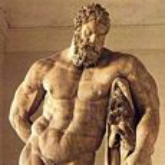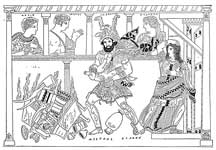Herakles - the Labours (Continued from Herakles - the Early Years) Herakles lived happily with his wife So all was well in 'Every moment that man lives is an insult to me', she cried 'living proof of the scandalous behaviour of that philandering villain who dares to call himself my husband!' (She was a bit upset - you can tell, can't you?). Unfortunately for Hera, she could find no sympathetic ear in That is, all except the Erinyes. These snake-haired, dog-headed, bat-winged creatures loved nobody. Commonly called 'The Furies' or 'The Solemn Ones', their only pleasure was to seek out those who had committed crimes, especially crimes against a parent; then they would plague and torment those persons, making their lives miserable until they craved for death to end their suffering. Hera approached the Erinnyes, and reminded them that Amphitryon, Herakles foster-father, had died while fighting alongside Herakles and Iphikles in the war against Erginus and his Minyan army. The Erinyes would not take into account that it was no fault of Herakles that Amphitryon had died, or that Herakles had loved Amphitryon, and always done him honour. Nor would they acknowledge that Amphitryon was not, in any case, Herakles' natural father; the Erinnyes loved to cause pain, and just like some humans who take pleasure in the suffering of others, they would not let the truth stand in the way of their self-righteousness. The Erinyes accepted Hera's commission to make Herakles regret that he had ever been born, and flew upon their dark bat-wings to His sight was suddenly clouded, his mind confused, he couldn't remember where he was. He dimly saw a figure beside him - surely an enemy! He lashed out, and his blow felled the anonymous person, then his sight strangely returned to reveal what could only be the Minyan forces of Erginus ready to attack, weapons raised! Herakles ran into the house and picked up his bow, then ran back out and let fly at the phantom figures. Down they fell as he let fly arrow after arrow in quick succession. From the corner of his eye he glimpsed another enemy charging towards him screaming, and he loosed yet another arrow towards the shadowy figure, then as it fell, he too collapsed with a cry into black unconsciousness. Herakles, in his madness, had killed all his children and two of Iphikles children. The last figure he had shot down was his beloved wife Hera's revenge was complete; when Herakles realised what he had done he was the most miserable, grief-stricken and self-loathing creature upon the face of the earth. In a few seconds of madness his life had been turned around completely. Herakles shut himself in a dark room, avoiding all contact with humanity, until Iolaus persuaded him that to grieve his life away would be to dishonour the memory of his wife and children. So Herakles took himself to his old friend King Thespius (the one with all the daughters), who purified his blood-guilt, and then went on to Herakles hated this. Eurystheus was almost universally despised throughout Some say that when Herakles set forth on his labours he was presented with gifts by his half-brothers and sisters, the gods. Hermes gave him a sword, Apollo a bow and eagle-feathered arrows, Hephaestus a golden breastplate and Athene a fine robe. Poseidon presented him with a team of horses to pull his chariot, Zeus a beautiful shield, inlaid with ivory, gold and precious stones. But in fact, Herakles declined to use armour, and after his first Labour, carried not even a spear, preferring to rely on his favourite and proven weapons, his wild-olive club and his strong bow. His nephew Iolaus accompanied him to
|

The Erinyes The Erinyes, more commonly known as "The Furies" were created from the blood of the Titan Ouranos (Uranus) when he was castrated by Cronos, his son. Others say that they were the daughters of Nyx (Night), herself a daughter of Chaos. It was generally thought that there were three Erinyes named Alecto ("Unceasing"), Megaera ("Grudging") and Tisiphone ("Avenging murder"). The heads of the Erinyes were crowned with serpents, their eyes dripped blood and even their breath was venomous. They were the agents of divine wrath and punished those who showed disrespect or arrogance. They reserved their particular vengeance for patricides and matricides, which were regarded as crimes against the gods.
 Herakles kills his wife and children |